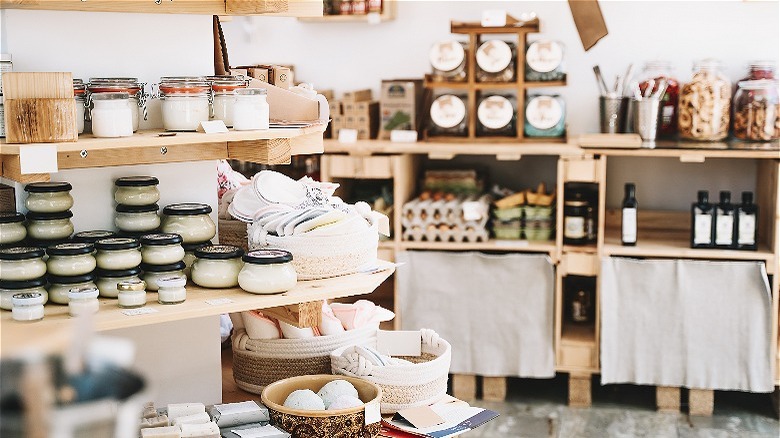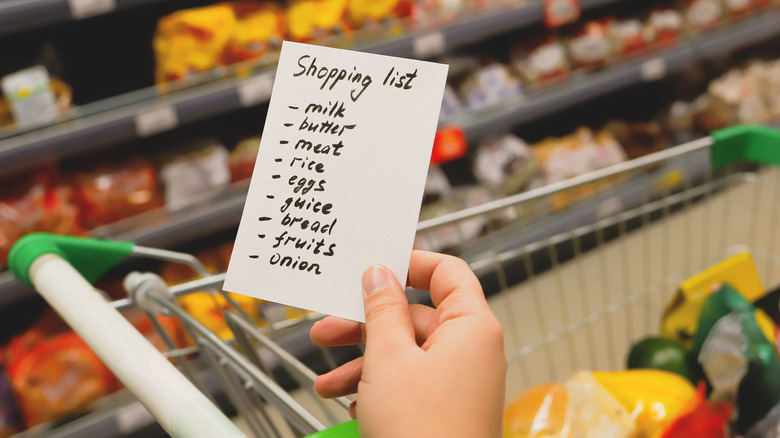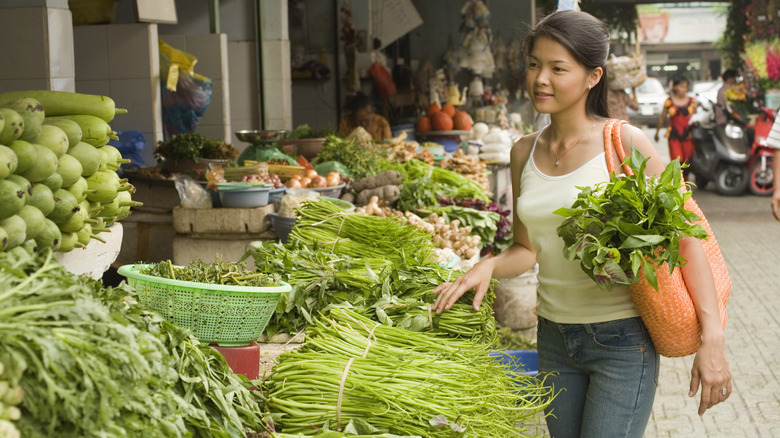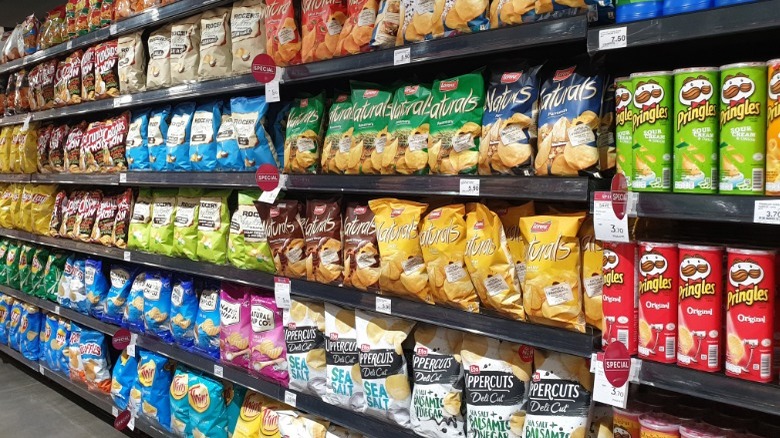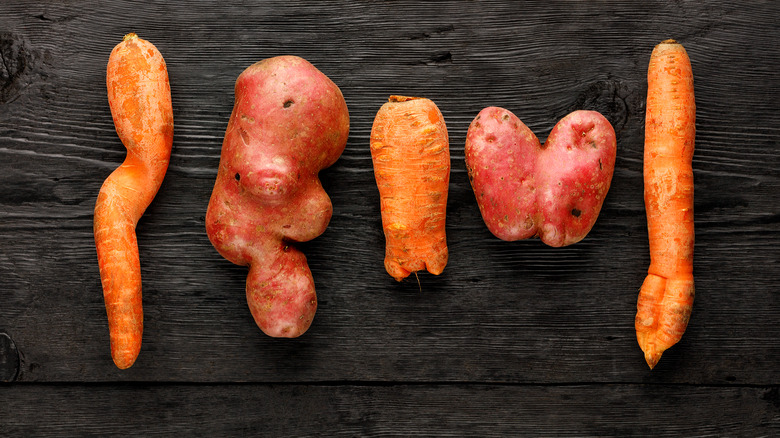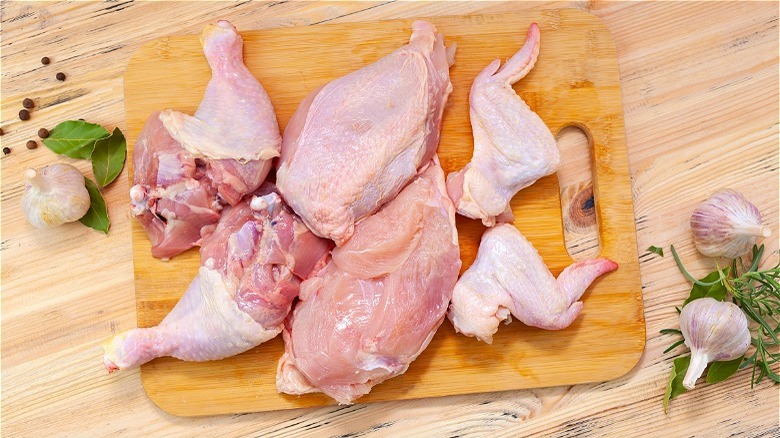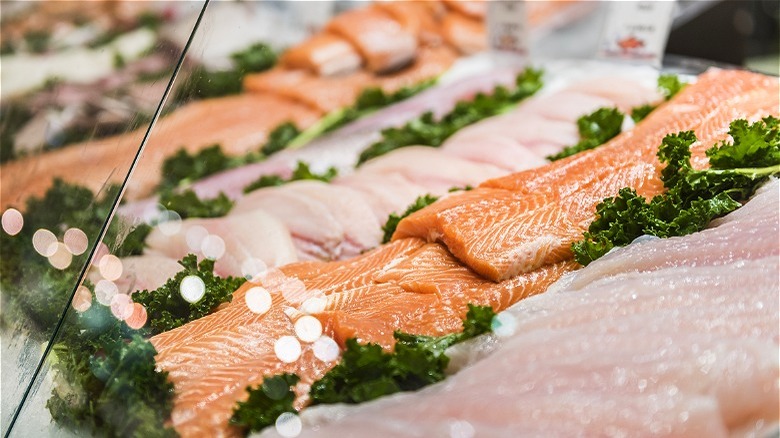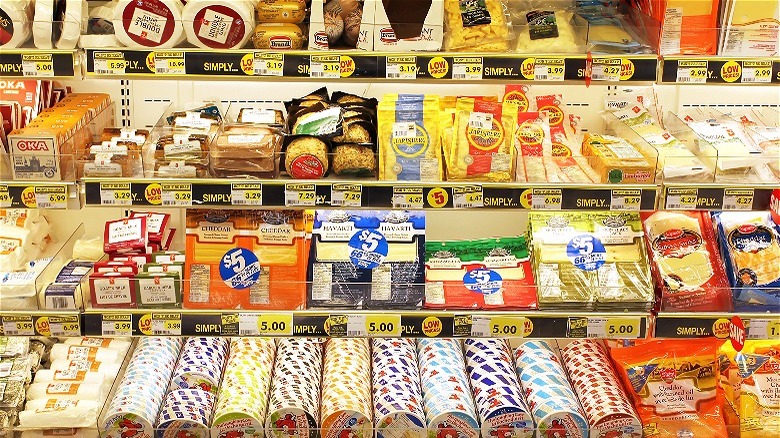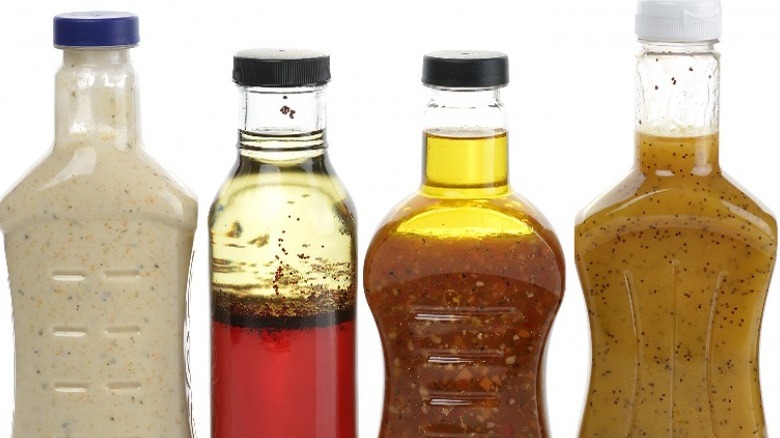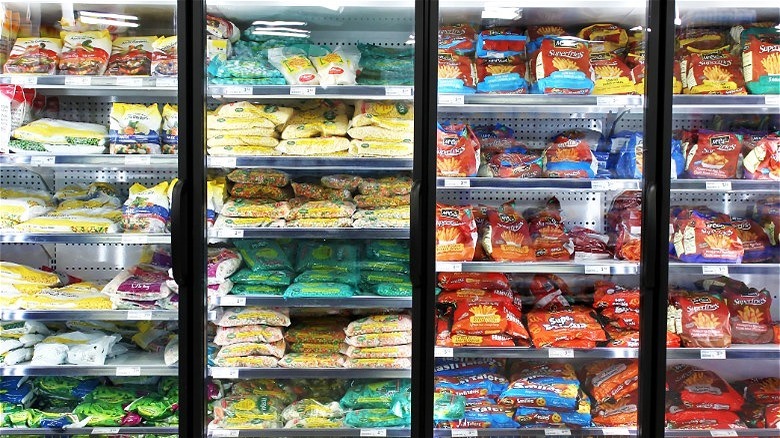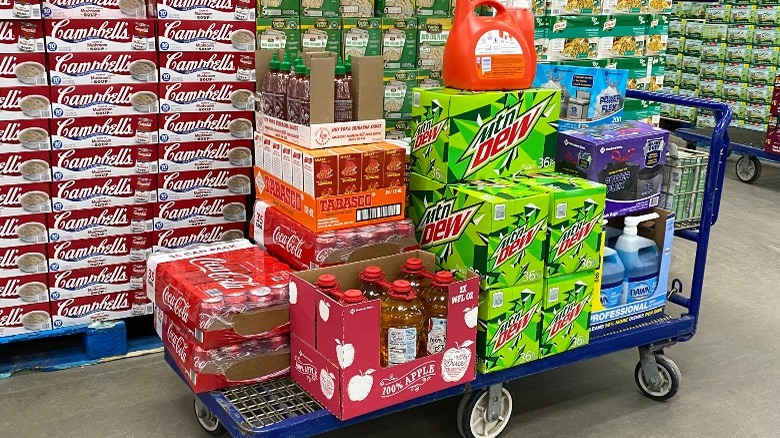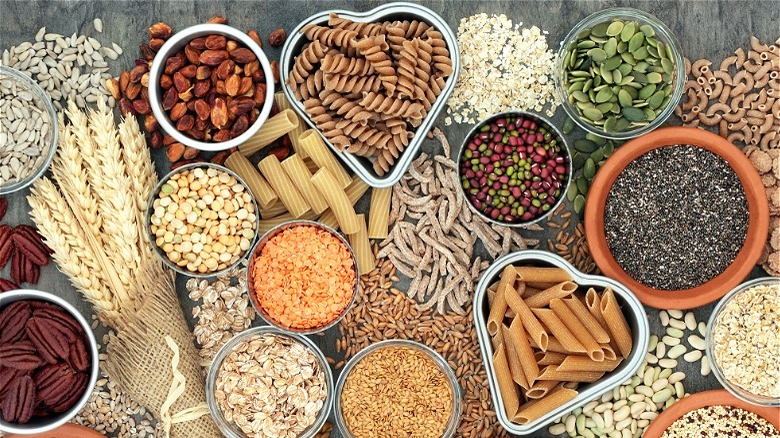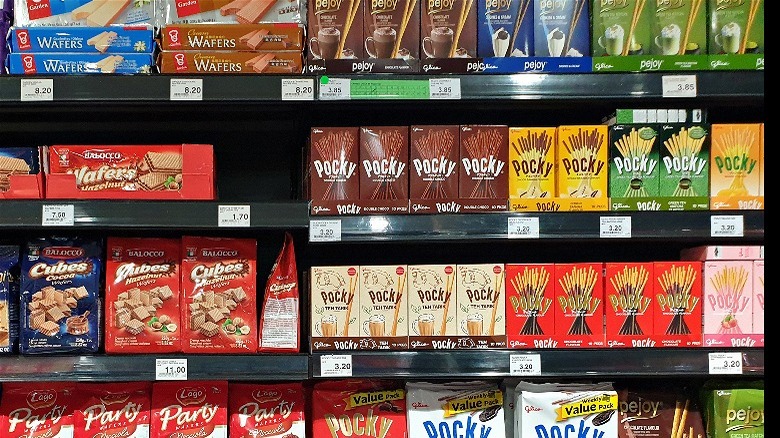13 Things Chefs Never Do When Grocery Shopping
Grocery shopping asks a lot of us. Each trip to the store requires us to make several decisions, and these choices aren't unimportant, either. What you buy at the store has an impact on how you'll feed yourself in the following days. It can also use up a significant amount of money, even when you're trying to save by not eating out. All of this choice-making and money-spending chaos at the grocery store can lead to frustration, according to Consumer Reports.
Difficulties arise due to a lack of knowledge. It can be hard to know what groceries to get and how many to purchase. Store sections like the produce aisle are especially intimidating. With duplicates of every item, you can get stuck trying to pick out the best fruit or vegetable. If you're at the grocery store with specific goals — like eating healthy, saving money, or splurging on higher-quality items — things can get even more complicated. Luckily, there are grocery shopping experts out there who buy food for a living, and some of those individuals happen to be chefs.
Chefs offer a wide range of grocery shopping tips. Whether they're private cooks or restaurant workers, these professionals visit the grocery store as part of their job. This passion for food often results in grocery shopping finesse and creativity. Chefs' grocery shopping expertise can help us be healthier, more ethical, and more interesting shoppers. They can even help us avoid mistakes. Read on to discover 13 things chefs never do when grocery shopping.
1. Chefs aren't afraid of small businesses and shopping local
Something that chefs never do while picking up groceries is avoid shopping locally and patronizing small businesses. Per Forbes, the two concepts are connected because shopping locally means supporting small businesses in your area. You can do this by buying from specific nearby stores like bakeries, patronizing farmers markets, eating seasonally, joining food co-ops, and looking for locally made goods within normal grocery stores, explains HowStuffWorks. According to a study published by Futurity, chefs who shop local once tend to continue doing so, and restaurant workers make supporting small businesses a habit.
Shopping local is beneficial for chefs creating trendier restaurants that incorporate a farm-to-table concept. It can also help cooks to build relationships with farmers and access higher-quality food (via Baywater Farms). Buying from local, small businesses can also aid individuals in reducing their carbon footprint, stimulating the local economy, and sometimes getting better customer service than they would from a bigger business, per Forbes. Locally grown food can also be more nutritious, according to Restorative Health. You can even shop local online.
2. Chefs never shop without an organized list
When chefs go grocery shopping, they never do so without an organized list. According to NPR, D.C.-area chef John Manolatos even keeps an ongoing record of things you should and shouldn't buy from the store. Manolatos likes to stay away from items like bagged lettuce, tomatoes, bread, or new species of genetically modified berries. But the cook says he recommends groceries like Greek yogurt, olive oil, grapes, organic milk, and frozen edamame. Most of these items are specific to this particular chef's life, which is why he keeps his favorites in his rotation. You can do the same by keeping track of which groceries you enjoy most.
Some chefs have specific formatting and planning tips that you can use to create your grocery list before arriving at the store. Alison Mountford, a former personal chef, says it doesn't matter if you make a printed, handwritten, or virtual list. Instead, she recommends specific list-making tips. To ease your grocery shopping trip, Mountford says to plan meals ahead of time, organize desired items into categories and subcategories, and think about the layout of the store you're going to. On the off days when you're not shopping, the personal chef recommends keeping track of items that you run out of, or items you remain fully stocked with. All of these tips help to create a list that ensures shopping success.
3. Chefs don't stick to grocery stores only
Chefs will never limit themselves to grocery stores alone when shopping. Instead, they are open to getting food from places like farmers markets. In cities like New York, there are organizations focused on consolidating information for all of the farmers markets nearby. As part of that mission, they keep a running list of the many chefs and restaurants that patronize these local markets. Per Grow NYC, these include renowned businesses like Olmsted, Winona's, Wildair, Bar Boulud, Daniel, Souen, and their chefs. Following this example can be a good idea because shopping at farmers markets can have advantages.
Getting groceries from the farmers market helps customers to get insider information and expert advice directly from the growers themselves. According to Nature's Path, this type of shopping also helps to reduce your carbon footprint because the food at farmers markets is usually local. This means energy wasn't expended to transport the food across the country to your produce aisle. With less time on the road, you also end up with fresher products. When stuff is fresh, that also usually means it's in season — bringing with it additional advantages in terms of nutrition. Plus, you'll usually have your pick of organic produce at the farmers market.
4. Chefs don't buy lots of processed foods
When you go to a restaurant, you don't usually see things like Cheetos, deli meat, or sugary cereal on the menu. That's because you don't pay these businesses to eat ready-made foods; you go to a restaurant to eat what professionals have created from scratch. Because of this, chefs don't spend most of their money on processed foods when grocery shopping for their businesses, or themselves.
Personal chefs like Jen Wanous and Bailey Cohen say everyone can benefit from buying less processed food, reports Newsweek. These foods not only cost more but can be bad for your health. Pre-made items like processed meat can be high in salt, fat, and unhealthy oils like cottonseed oil. Chef Michael Smith also feels negative about factory-made groceries. He suggests looking for foods with shorter ingredient lists on their packaging. Some of the best items to stay away from include pre-grated, unrefrigerated parmesan cheese and boxed dessert mix.
5. Chefs aren't afraid of ugly produce
Chefs aren't afraid of buying so-called "ugly" produce while grocery shopping. Per Restaurant Hospitality, cooks see imperfect yet fresh-looking pieces of produce as ways to eliminate food waste. When a bell pepper or carrot is misshapen but fresh, chefs can deconstruct them and use them in dishes like soup or juice. While cutting down on the amount of garbage or compost they have, "ugly produce" also helps chefs to save money since sometimes lopsided fruits and vegetables cost less.
If you want to save money while eliminating food waste, you can do what some chefs do and sign up for an ugly produce CSA. The term — which stands for community-supported agriculture — is a paid partnership in which individuals receive consistent shipments of food from local farms for a period of time. Popular ugly food CSA-type companies include Misfits Markets and Imperfect Produce.
However, people have pointed out that these companies may be overstating how much food waste individuals are helping to eliminate by buying from them, per Vox. So you shouldn't feel pressured to patronize these particular CSAs, since the restaurant industry has a long history of buying ugly produce anyway. Instead, the next time you are at the grocery store or farmers market, just don't be afraid of picking up a lumpy lemon or an oddly shaped eggplant.
6. Chefs don't buy meats that have already been broken down
When shopping, chefs usually stick to whole meats — rather than proteins that have already been broken down. Chef John McClure recommends buying whole chickens because they are versatile: They can be used as is or taken apart (via The Pueblo Chieftain). McClure also says that buying whole chickens is what happens when you shop locally. When you do, those whole chickens tend to taste especially fresh.
Other chefs, like Samin Nosrat, recommend buying whole animals because this is typically cheaper than buying individual cuts. You'll usually spend less for chicken breasts from a whole chicken than you would for breasts that come sold individually. In addition to those classic cuts, the whole chicken affords you extra things like giblets, dark meat, trimmings, and bones. These can be used for making soups, stocks, pies, and more. The hardest part is not being intimidated by purchasing whole birds. It will take some time, but once you know what to do with the bird, you'll reap the benefits.
7. Chefs don't just pick up whatever seafood is available
Unlike some shoppers, chefs are picky when it comes to choosing seafood. They will not purchase just any fish that they see. To start, chefs head to specific places to pick out their fish. According to Just Luxe, some chefs go to their local farmers market, where they can purchase seafood from nearby fishermen. The smaller the seafood supplier, the better, they believe. Typically, these smaller businesses produce less waste and have a higher-quality product.
Once they've figured out where to shop, chefs have a few methods of deciding which fish to buy. Per Chef Sac, some professionals conduct a series of tests on the fish to check for its freshness. One is called the "eye test." This involves looking to see if a fish's eyes are firm, with large pupils. Then there's the "smell test," aka checking that the fish's scent is mild. There's also the "gills test," in which a chef looks for red-colored fish gills. If a fish has all of these things, it's probably fresh. Per the Michelin Guide, you can also examine the fins and tail (to see if they are nimble and intact) and the scales (to see if they are shiny and feel they are firm) to test for freshness. If your fish has these qualities, it's probably good to purchase. Don't forget to check the expiration date, as well.
8. Chefs steer clear of low-priced cheese
Another thing chefs avoid doing while grocery shopping is buying inexpensive cheeses. Andrew Whitcomb of the Brooklyn restaurant Colonie told Vogue that cheese is an item he'll splurge on. Fellow New York chef Trevor Kunk of Blue Hill told DNAInfo that he likes to patronize specialty cheese shops like Murray's — where you will spend more to get higher-quality cheese. These products may cost more for different reasons. Per Luxury Columnist, artisanal cheeses may have high prices due to being made from hard-to-find ingredients. On the other hand, these cheeses may be expensive to produce.
But as Your Cheesemonger explains, higher-quality cheeses are worth spending money on. That's because they often taste more flavorful, meaning you'll need to eat (or use) less to be satisfied. Plus, you can buy small amounts of each, allowing you to sample many new kinds of cheese without buying something you may not like. Usually, buying more expensive, high-quality cheese from local stores or markets also helps to support your surrounding food ecosystem.
9. Chefs never purchase prepared foods
Similar to the way they stay away from processed food, chefs steer clear of prepared foods. This includes things you'll find at the grocery store deli counter or packaged foods like salad dressing. According to PennLive, some chefs say that prepared foods can be more expensive and less healthy than individual ingredients. Chef Scott Karns recommends staying away from things like pre-made mashed potatoes and canned soup.
Cook Michael Barclay agrees. As a word of advice to new chefs, he told The Guardian that it's best to avoid prepared ingredients like cut carrots or grated cheese. While pre-made items may save you cooking time, they present other issues. Per Consumer Reports, the food used for prepared items at the grocery store may be less fresh, have incomplete information regarding nutritional content, and have a higher level of salt. Instead of dealing with these issues, do as chefs do and try making things yourself.
10. Chefs won't buy just any frozen food
Frozen food is not something that all chefs will shy away from; unlike processed or prepared foods, some chefs see the good in these convenient items. These foods are beloved for their affordability, availability, nutrition, food safety, and more, explains Easy Home Meals. According to Insider, chefs appreciate frozen foods like sweet corn, Brussels sprouts, freshly frozen shrimp, edamame, and peas.
However, chefs don't seem to think that all frozen food is good. Some cooks recommend staying away from frozen foods like burgers, smoothie mixtures, pasta, delicate vegetables, and pre-cooked rice (via Insider). These foods either don't freeze well, are easy to make from scratch, or come with unhealthy additives when frozen. If you want to follow the example of professionals, don't buy these things. In general, it seems that most chefs stick with frozen whole foods like fruits and vegetables when shopping in this store section.
11. Chefs don't purchase all items in bulk
Chefs have rules when they go shopping. But rather than seeing these things as limiting, think of them as ways to minimize decisions to save time at the store. You can use that extra time to put a little extra love into what you're cooking. One of the rules that most chefs follow is being selective about what they buy in bulk.
Per Insider, Chef Lizzy Briskin advises against buying bulk portions of certain foods. Briskin doesn't buy items that will go bad before she is able to use of them, including foods like breadcrumbs, mixed nuts, baked goods, or fruit. These items take up kitchen or fridge space while fresh, then often get thrown away without being completely eaten. The same goes for large cans of things like tomato sauce. While leftovers of tomato sauce can be frozen and used for a later date, the freezer space isn't always available for saving them.
However, other chefs like Floyd Cardoz think there is a time and place for buying in bulk. Cardoz recommends buying groceries such as unfrozen burger meat in bulk (via Insider). Large servings of this food come in handy while hosting events such as barbecues or birthday parties.
12. Chefs never stick to just white rice
When grocery shopping, chefs never seem to limit themselves to white rice when shopping for grains. It's not that they have a problem with white rice, but most chefs are open to more than this one type of grain.
According to Sauce Magazine, chefs seem to love ancient grains. You may have seen these foods on restaurant menus in the past decade, thanks to a renewed interest in their health benefits. Per Healthline, most ancient grains tend to be less processed and more nutritious than others. Some of the most popular grains of this sort include quinoa, amaranth, bulgur, and sorghum. You can use these ingredients for crisping, as crunchy grains work great with desserts or curries. Otherwise, you can simply cook the ingredients and add them to a vegetable-filled ancient grains bowl. You can also use items like farro in salads, such as this farro and beet salad.
13. Chefs aren't afraid of treats
It's not all fresh produce, meat, and fish on a chef's grocery list; they also like to stock up on ingredients for making desserts at home. Per Departures, some dessert recipes beloved by chefs are chocolate-heavy. They include recipes like chocolate torte, chocolate, strawberries, chocolate mousse, or Devil's Food Cake. Pastry chefs, on the other hand, tend to gravitate towards things you'd find in a bakery, like eclairs, French toast, Panettone, tarts, conchas, and marshmallows.
If you want to not only shop like a chef but make a dessert like one, you can start by learning to make a few key dishes. Per Insider, there are some recipes that chefs recommend aspiring at-home dessert experts should try first, including a soufflé, lemon-vanilla cake, chocolate olive oil cake, rhubarb crumble, lemon drizzle cake, and a sour cherry crumble tart. When making dessert at home, you can also look to improve upon classic sweets with chef-loved ingredients for baking. These include buttermilk, coffee, and whipped cream (via Condé Nast Traveler).

